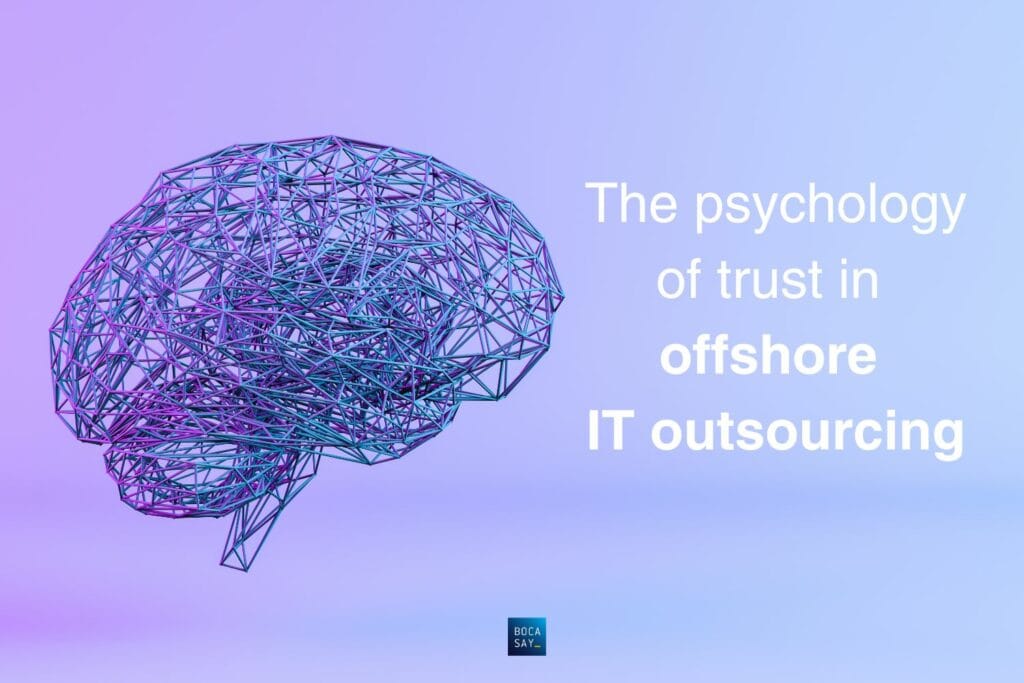The Psychology of Trust in IT Outsourcing, the Road to Success
IT Outsourcing, an increasingly common practice in the business world, has become a key element of the strategy for many companies. However, it’s not just a matter of cost reduction or access to specialized skills. The success of IT outsourcing largely relies on an intangible but fundamental factor: trust.
In this article, we will delve deep into the nuances of trust in relationships between client companies and IT service providers. We will highlight the tangible impact of trust on the success of outsourcing.
Context of IT Outsourcing
IT outsourcing, often referred to as offshore software development or IT outsourcing, has become a colossal industry, with a global market that reached $366 billion in 2021, according to Statista. This sustained growth underscores the increasing importance of outsourcing in the economic landscape. However, succeeding in this field requires much more than just signing a contract. Trust, defined as the deep conviction that the other party will act in your best interest, is the glue that holds these partnerships together.

What is Trust in Offshore Outsourcing?
To delve into the psychology of trust, let’s begin by defining this complex concept. In the context of IT outsourcing, trust goes beyond the belief that the other party will adhere to the terms of the contract. It also encompasses deep psychological elements, including perceptions of:
- Integrity,
- Perceived Competence,
- Benevolence.
Integrity: Integrity, as a component of trust, is crucial. A 2023 study by Deloitte revealed that 78% of companies consider the integrity of the service provider as the most important factor in establishing trust. When companies perceive that the provider acts ethically, it reinforces trust.
Perceived Competence: One of the reasons companies outsource is to access technical skills they don’t have available in-house. Perceived competence is, therefore, essential. For example, let’s imagine the fictional logistics company ABC, which outsourced its supply chain management and saw a 15% increase in revenue. This significant improvement illustrates the importance of perceived competence in building trust.
Benevolence: Benevolence is often an underestimated dimension of trust. Client companies must also perceive a sincere willingness on the part of the provider to help and contribute to their success. Taking a second fictional example, company DEF experienced a major IT system breakdown. Its IT service provider worked day and night to restore operations, demonstrating exceptional benevolence, and consequently, solid trust.
Bocasay, as an offshore IT services company, is committed to establishing a climate of trust with all its clients. Software development, especially in Vietnam, among other places, is our core business, but the trust we build with our clients and partners is the engine that powers this core to its fullest capacity.
The Familiarity Effect
The familiarity effect is particularly relevant in our case. The more parties work together and get to know each other, the more trust can develop. A study conducted by Gartner in 2023 found that companies that maintained long-term relationships with their providers were more likely to achieve their quality and cost goals. This finding highlights the importance of the longevity of the relationship in building trust.
Managing Psychological Risks
Risk-taking is inevitable in IT outsourcing, but client companies must learn to manage psychological risks in order to succeed. This includes the fear of losing control. The fictional company GHI has established regular meetings with its offshore IT provider to maintain an open dialogue about potential risks. This proactive approach helped reduce fears related to loss of control and strengthened trust.
How to Build a Strong Trust Relationship when Outsourcing Your Offshore Development?
Establish Clear Expectations
A case study conducted by McKinsey in 2023 revealed that companies that set clear expectations from the outset were more likely to maintain a stable trust relationship with their providers. Among other things, you can establish a detailed Service Level Agreement (SLA) at the beginning of your collaboration with your provider, which will help you avoid misunderstandings and potential disappointments.
Open and Transparent Communication
Improve your satisfaction by 20% by setting up transparent communication channels with your offshore partner and encouraging continuous feedback. Openness and transparency strengthen trust by allowing parties to quickly resolve issues and adapt to changes.
Continuous Monitoring and Evaluation
Consider using performance evaluation tools to identify areas for improvement, which can lead to a 25% increase in operational efficiency. Regular performance monitoring has the effect of maintaining trust by ensuring that expectations are met.
Trust Evolution Over Time
In general, unless otherwise indicated, trust in your provider will strengthen over the years, resulting in a 12% reduction in costs and an improvement in the quality of your services. This evolution illustrates how trust can grow over time and lead to tangible benefits.
Trust in IT outsourcing is much more than just an abstract concept. It is a fundamental pillar of success. Understanding the psychology of trust, nurturing it, and preserving it over time is an essential strategy for companies looking to thrive in their IT outsourcing projects. Well-established trust serves as the bridge between exceptional results and fruitful long-term partnerships. By investing in trust, client companies and IT service providers reap the rewards of a successful and sustainable win-win collaboration.